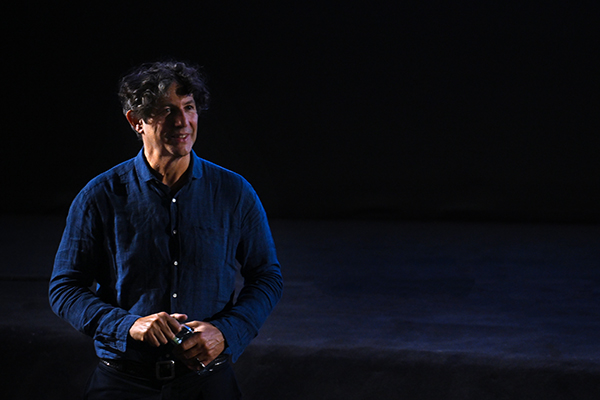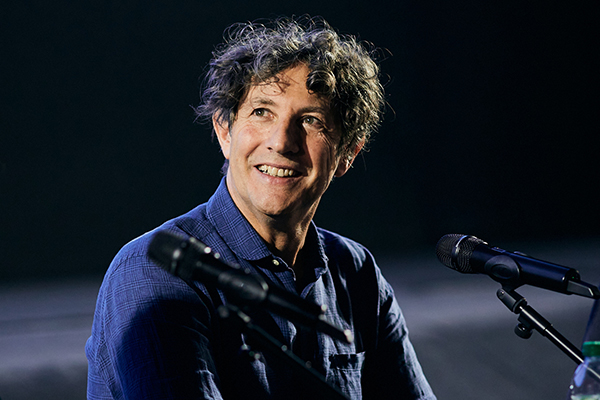Jonathan Glazer
"I watch films to make sure that my thinking is truly original"
Posted on 16.10.2023
On Sunday, British director Jonathan Glazer overcame his shyness to give the audience at the Pathé Bellecour some insight into his cinema.
On his passion for film:
I've seen a lot of movies in my life. Of course, I've had periods when that's all I've done all day. The times when I've been less glued to a screen generally correspond to periods when I'm writing my own work. I studied filmmakers when I was at film school. Even today, if I meet a director who intrigues me, I like to immerse myself in their work. Of course, I'm not like I was at 25, when I devoured everything. Today I'm pickier. But I also watch films to make sure that my thinking is truly original. I love not knowing much about a film when I first see it.
On his interest in the barbarity of ordinary people in The Zone of Interest:
I had to make this film. Violence is a part of us and it's everywhere in our world. It took me a long time to write the film and, in the meantime, society has also evolved in its violence. Everything I show in the film is an echo of our society every day. I had no choice but to tell this story. There are two films in The Zone of Interest: the one you see and the one you hear. And when the two are mixed together, a third film comes along to shock the audience.
 © Olivier Chassignole
© Olivier Chassignole
On his profession as a filmmaker:
I never really feel like a filmmaker. I simply need to express feelings and I need to find the best way to do it, from feature films to art installations to music videos. My wife says that my films are a “platform” of my feelings.
On his great interest in sound:
I love music and when you listen to music it's not unusual for images to appear in your mind. For me, sound is another way of showing things. There are films in which you can close your eyes and still have no trouble seeing the images. You can build a whole world with sound. Sound can help us create a real world, but it can also take us to another world. The image offers something to see and sound can deepen it. It's a resource that I never hesitate to use.
On his choice of the territories he explores in his films, including the forest:
I think it's a question of feeling. I like an area to be responsive, to make me feel something. I like to discover what a place can bring me as a territory, and what it can bring to the story. I like to imagine these places as an arena, a stage, a theatre. I'm English, but it's not my nationality that determines where I shoot. The forest is also an area that I’m very fond of. Perhaps it has something to do with the vulnerability in which it places us as human beings.
On the way he places the viewer at a distance from the action:
Distance is very important to me. Showing situations without getting close to them allows me to involve the viewers. But it's not the only way. If I have to show a face in close-up, which is the most beautiful landscape there is, I want it to be for a good reason. It's almost an anthropological question.
On his relationship with the intimacy of his characters:
My ideas always come from a feeling. That's where everything starts for me. And it's something that's extremely intimate and very important to me. I want to remain profoundly human. I always try to approach something very human in everything I do. I need to feel what I'm filming. What interests me is what our values are. Which ones are important to us. Flaws are what make us human. In Under The Skin, the alien played by Scarlett Johansson recognises feelings within her. That's what drives her. This journey towards humanity is the opposite of the path chosen by the characters in The Zone of Interest, who become zombies.
 © Léa Rener
© Léa Rener
On the body:
I like to communicate the feelings at the heart of my work through the physicality of the characters. The human body interests me. I'm interested in the human being in the cosmos. I always observe how an actor moves. The body doesn't lie, words do. When you cast someone, you have to keep that in mind, even for the greatest of actors. I'm intrigued by that. Physicality is very important to me, it's a means of communication that can dictate my directorial choices.
On the heavy presence of black in his filmography:
Ideas come from nothingness, from absence, and black is the colour that best represents them. But it can also be white or red. This technique allows me to let the viewer imagine and conceptualise. The Zone of Interest begins with four minutes of black and ends with seven minutes of black. Black is a way of inviting the viewer to enter the place I'm going to suggest. But also to let them know that what they hear will be just as important as what they see. It allows them to enter the first image of the film having already become part of it. And the darkness at the end of the film is a kind of decompression chamber.
On his relationship with dialogue:
If I could, I would make a film without dialogue. It's fascinating to me to be able to tell a story through images. For me, there are two languages: the one you speak and the one you don't speak. That creates barriers. I like the idea that there is a reality behind language. Language is a barrier that divides, whereas images open up the world.
On the theme of humanity, which is very present in his films :
I'm interested in cinema as a philosophical and political space. The directors I admire were masters in these areas. It takes a lot of time and thought to achieve something that matters to you. It's a very personal thing. If it matters to you, it may also matter to others. My job, then, is to communicate this personal point of view, even if it's difficult. The difficulty of achieving it is also part of the message to be conveyed.
Reported by Benoit Pavan

